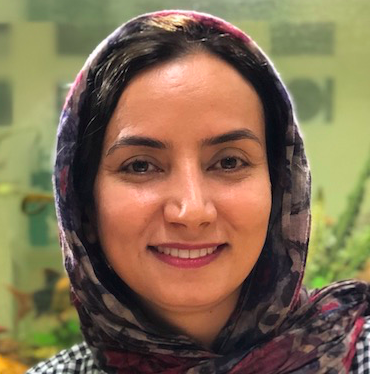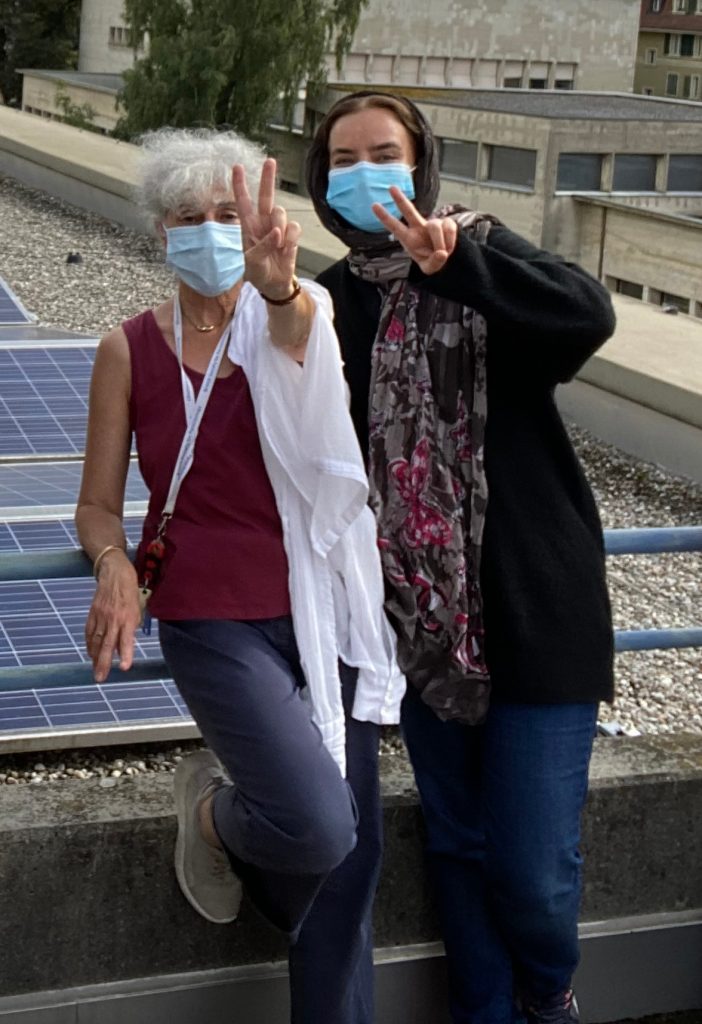Young biologist from Iran won post-doc scholarship

Zahra is a medical parasitologist from Iran. She came to Bern on a Global Connections fellowship in summer 2021. The fellowship funds short stays for early-career researchers. During her PhD studies, Zahra attended the Middle Eastern Biology of Parasitism (MeBoP) summer school, where she met Isabel Roditi, co-director of the Institute of Cell Biology at the University of Bern. Isabel encouraged her to apply for the fellowship and join her team.
Zahra, please tell us more about where you are from?
I graduated with a PhD in medical parasitology from Shiraz University of Medical Sciences in Iran. Before coming to Bern, I worked at the Clinical Microbiology Research Center, Shiraz University of Medical Sciences. I study infectious diseases caused by Leishmania, Toxoplasma, Echinococcus and many more.
Why the University of Bern?
This is an amazing story – I sometimes wake up and think it is just a dream. When I applied for the MeBoP summer school, I couldn’t believe I was selected to attend. One of the best things that happened to me during MeBoP was meeting Isabel Roditi, who is a professor at the Institute of Cell Biology at the University of Bern. She is not only a great scientist but a wonderful human being. She told me about the Global Connections fellowship, which funds research stays of early-career scientists at the University of Bern.
I was the first researcher to be awarded a Global Connections fellowship. This position was like a shimmer of hope. I said to myself: hey Zahra! A fellowship at the University of Bern – what do you want more? Even if this is just for three months, this will be an opportunity to learn new techniques, which will be very helpful for my future career.
What is your research project in Bern about?
I was part of a team led by Carmen Faso, who is a parasitologist and SNF Prima professor at the Institute of Cell Biology. I researched nanobodies, which are special types of antibodies that originally come from alpacas but can be produced in large amounts in the laboratory without the need for animal testing. The aim is to use these as a diagnostic tool for infections with Giardia, a parasite that causes diarrhea in humans. I helped to identify a new target where the nanobodies bind to the parasite’s cyst wall. My training was carried out under the supervision of Corina Wirdnam and in collaboration with an MSc candidate, Tim Schärer.
In a second project in the laboratory led by Isabel Roditi I learned how to apply CRISPR-Cas9 (the genome editing technique that won the Nobel prize in 2020) to Trypanosoma brucei, which is a parasite that causes human sleeping sickness. This work was carried out under the supervision of Berta Pozzi.

How did the Corona-pandemic affect you?
I faced challenges in getting my visa and when traveling. I was afraid that the Swiss regulations would change and that they would stop accepting people from countries with a high rate of infection. The most worrying thing was that everything was changing from moment to moment.
The Swiss embassy informed me that I should be quarantined for ten days as soon as I arrived in Switzerland, even though I had been vaccinated and had a negative PCR test. Being ten days in quarantine was a daunting prospect and took valuable time out of a fellowship programme that lasted only 90 days. Fortunately, when I arrived in Switzerland, I noticed that it was no longer necessary to be quarantined.
How did you like working and living in Bern?
The friendly relations between the principal investigators, staff, and students are really wonderful here. I have no experience of living in other cities of Switzerland except Bern, but Bern is really beautiful, quiet and the people are lovely!
What are your plans for the future?
I’m looking for a postdoc position. I would like to bring things that I have learned in Bern back to my home country. I have a plan to improve the current diagnostic test for visceral leishmaniasis with the things I have learned at the University of Bern.
How has the Uni Bern scholarship helped you prepare for your next career step?
This Global Connections fellowship will pave the way for me to do high-quality research. It also strengthens my CV and will be an essential factor in finding a postdoc position abroad, which is something I am looking for at the moment. I learned so much from Isabel Roditi and Carmen Faso, who are brilliant scientists. I will start my next project based on what I learned at the University of Bern.
Further information
The Global Connections fellowship funds research stays of 2-3 months at the Faculty of Science for early-career researchers with a grant worth up to 10,000 CHF. The fellowship aims to fund promising young researchers who are based in countries with limited travel resources. Find out more here.
The Middle Eastern Biology of Parasitism (MeBoP) summer school brings together early-career scientists from all over the Middle East to study the biology of parasites and collaborate with other scientists from the region and beyond. Find out more here.
Text: Zahra Razaei
Images: Zahra Razaei